SIBO ali prekomerna rast bakterij v tankem črevesu je stanje, pri katerem običajne bakterije, ki običajno živijo v nas, na koncu živijo v tankem črevesu v večjem številu kot običajno, kar povzroča opustošenje. Do 20 % Američanov in 1 od 5 Avstralcev ima sindrom razdražljivega črevesja. Raziskave kažejo, da ima v povprečju 60 % vseh ljudi s IBS dejansko SIBO, zato je to stanje pogosto, vendar ni vedno dobro znano.
Preden se poglobimo v to, kaj povzroča SIBO ter kako in zakaj ga razvijemo, si najprej poglejmo, kako deluje prebavni sistem, saj to pomaga razložiti, kaj gre narobe, ko razvijemo SIBO.
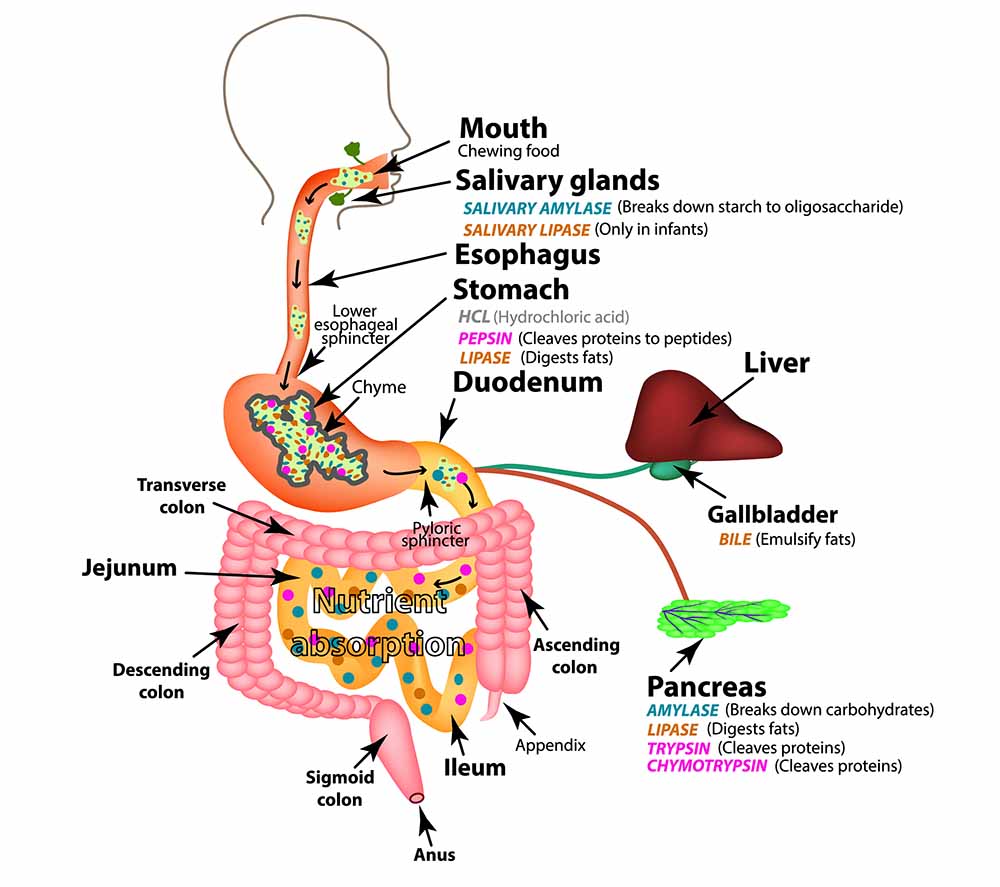
Človeški prebavni sistem je ena dolga, neprekinjena cev, razdeljena na dele, ki se začne pri ustih in konča pri anusu. Podpira kompleksen proces prebave hrane tako, da jo pretvori v hranila, ki jih telo uporablja za energijo in na koncu za preživetje. Stari pregovor 'ti si to, kar ješ' je delno resničen, saj nismo samo to, kar jemo, ampak tudi tisto, kar absorbiramo.
Prebava se zgodi, še preden zaužijemo prvi zalogaj hrane. Ko začnemo razmišljati o prehranjevanju, začnemo kuhati ali opazovati pripravo naše hrane, možgani pošljejo signale v prebavni trakt, da se pripravijo na hrano. Naše žleze slinavke začnejo proizvajati slino, ki nam pomaga razgraditi hrano. Ob prvem zaužitju hrane se poveča izločanje sline, zobje in jezik pa nam pomagajo pri žvečenju hrane, kar je prvi korak pri razgradnji hrane za prebavo. Slina vsebuje encime, ki pomagajo razgraditi hrano, zato je temeljito prežvečenje hrane tako pomembno za boljšo prebavo.
Ko pogoltnemo, naša hrana preide po požiralniku z vrsto mišičnih kontrakcij, peristaltiko, preden prispe v želodec. Spodnji ezofagealni sfinkter se odpre, da dovoli hrano v želodec, nato pa se ponovno zapre, da ostane tam. Če ta sfinkter ne deluje pravilno, lahko ljudje doživijo GERB ali zgago zaradi občutka, da hrana prihaja nazaj v požiralnik.
Ne samo, da želodec deluje kot zadrževalna vrečka za hrano, ampak tudi sprošča več prebavnih encimov in kislin, da dodatno izboljša prebavo hrane, tako da jo spremeni v gosto kislo pasto, imenovano himus.
Ko je himus pripravljen za obdelavo, ga peristaltični valovi potisnejo proti piloričnemu sfinkterju, prehodu med želodcem in tankim črevesjem. Na kratko se odpre, tako da majhna količina preide skozi in začne proces absorpcije v tankem črevesu. Vsa hrana ne steče naenkrat, saj bi to preplavilo sistem in ne bi bilo obvladljive količine, s katero bi se čim bolj absorbiralo.
Pilorični sfinkter deluje kot enosmerna vrata, ki preprečujejo, da bi se himus iz tankega črevesa vrnil nazaj v želodec.
Želodec je glavni obrambni sistem za bakterije in patogene organizme, ki jih zaužijemo, pri čemer jih večina na tej točki uniči. Če nimate dovolj encimov ali kislin, lahko bakterije preživijo in se premaknejo v tanko črevo.
Tanko črevo je delovni konj prebavnega sistema, saj se tam absorbira večina naših hranil. Dolg je približno 6 metrov (20 čevljev) in je razdeljen na tri dele:dvanajsternik, jejunum in ileum. Dvanajstnik je večinoma odgovoren za nadaljevanje razgradnje himusa, ki ga podpirajo encimi iz trebušne slinavke in žolč iz jeter, jejunum in ileum pa sta odgovorna predvsem za absorpcijo hranil v krvni obtok skozi resice in mikroresice.
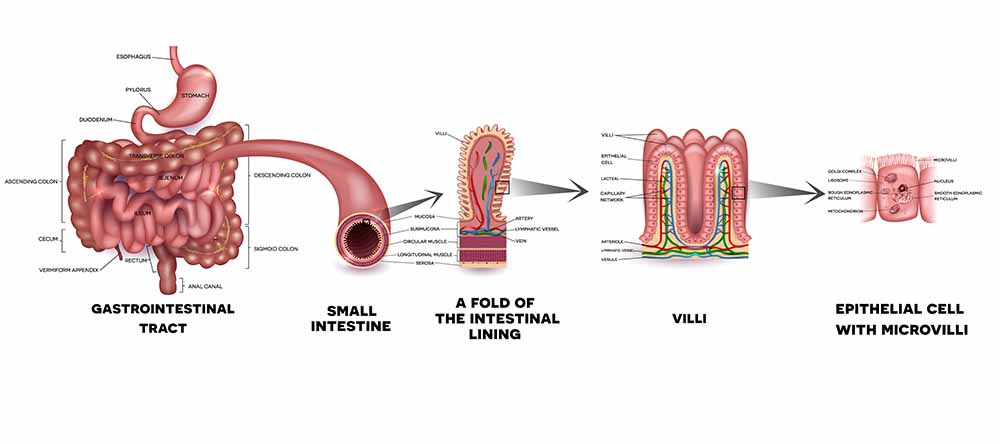
Te prstaste strukture v tankem črevesu nam pomagajo absorbirati hranila. Vsaka resica (singularna resica) ima mikroresice, ki jo pokrivajo, kar poveča površino tankega črevesa. Morebitni ostanki himusa se nato premaknejo v debelo črevo.
Ker je vloga tankega črevesa absorbirati hranila iz hrane, za to ne potrebuje pomoči bakterij in mora biti razmeroma sterilno okolje. Če imamo v tankem črevesu veliko število bakterij, tekmujejo z nami za našo hrano in ovirajo prebavo in absorpcijo. Zato lahko ljudje s SIBO občutijo neprijetne simptome in občutijo pomanjkljivosti – njihovo tanko črevo tukaj ni opremljeno za spopadanje z bakterijami.
Proces premikanja snovi skozi debelo črevo se imenuje gibljivost. Migracijski motorični kompleks (MMC) ali val pometača potiska ostanke odpadkov in druge snovi, kot so bakterije, vzdolž tankega črevesa in ga očisti tako, da ne miruje. Ta proces je zelo odvisen od mreže živcev, mišic in hormonov in se pojavi na tešče (tj. ne, ko jeste) vsakih 90 minut in čez noč ter je običajno moten pri bolnikih s SIBO. Zato se bolnikom s SIBO običajno priporoča občasno postenje, brez prigrizkov in 4-5 ur med obroki.
Zaklopka med tankim in debelim črevesjem se imenuje ileocekalna zaklopka in deluje kot enosmerni sistem, ki preprečuje, da bi snov v debelem črevesu ponovno prišla v tanko črevo.
Traja 3-5 ur, da se himus popolnoma izprazni iz želodca in tankega črevesa ter se premakne v debelo črevo.
Debelo črevo je dolgo približno 1,5 metra (5 čevljev) in se povezuje s tankim črevesjem in danko ter je razdeljeno na slepo črevo, naraščajoče debelo črevo, prečno debelo črevo, padajoče debelo črevo in sigmoidno črevo.
V njem so bilijoni bakterij. Primarna funkcija debelega črevesa je popolna absorpcija hranil in vode, sintetiziranje določenih vitaminov, tvorba blata in njihovo izločanje iz telesa.
Bakterije, ki živijo v črevesju, se imenujejo črevesni mikrobiom in mikrobiom vsake osebe je edinstven zanj.
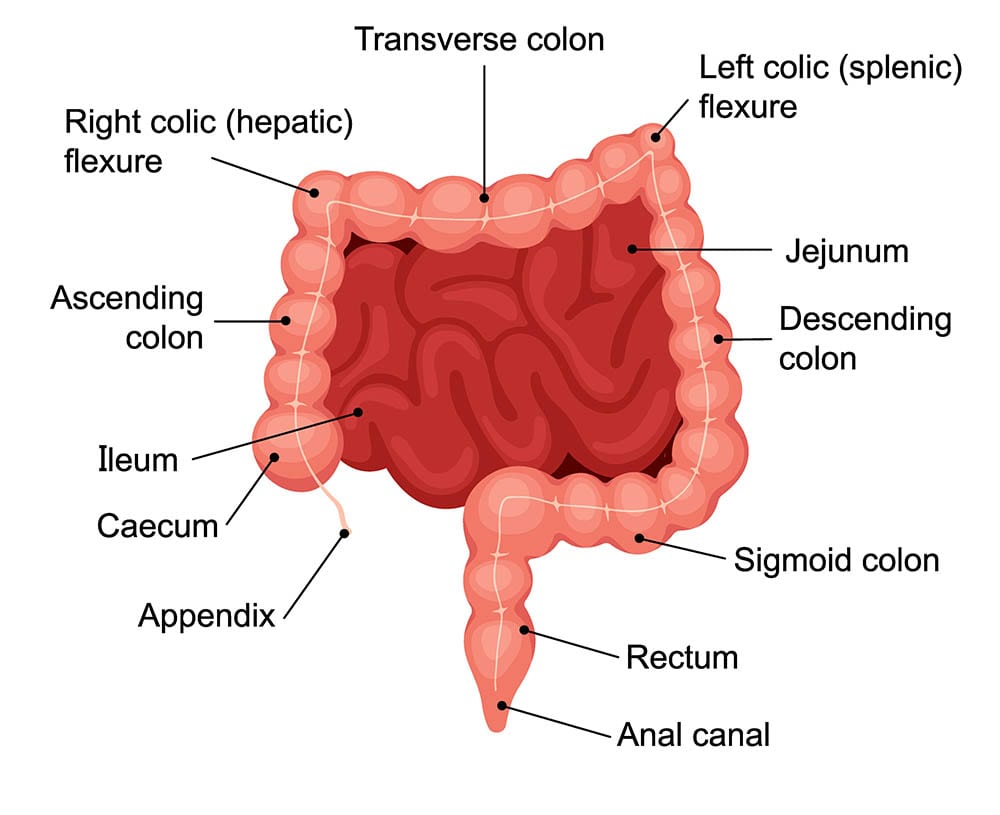
Cimus vstopi v slepo črevo iz tankega črevesa in se s procesom peristaltike počasi premika skozi debelo črevo, pri čemer se voda absorbira iz njega, tako da preide iz tekočega v trdno stanje. Če se snov premika prehitro, se ne absorbira dovolj vode, kar lahko povzroči dehidracijo in drisko. Če se snov premika prepočasi, se lahko absorbira preveč tekočine, zaradi česar je blato preveč trdno in povzroči zaprtje.
Iztrebki so večinoma sestavljeni iz neprebavljenih delcev hrane, bakterij, starih epitelijskih celic iz sluznice GI, anorganskih soli in vode. Ko doseže rektum, pošlje signal v možgane, da vedo, da ga je treba izprazniti. Običajno poznamo ta občutek, da je treba pokakati. Prostovoljno lahko nadzorujemo željo po kakenju tako, da se držimo, dokler ne pridemo do stranišča. Iztrebki se nato izpeljejo skozi anus in iz telesa.
Pridobite takojšen dostop do 5 tednov neprecenljive vsebine SIBO in strokovnih vpogledov na enem mestu.
Ta tečaj na zahtevo je začetek vaše poti nazaj k zdravju. In odlična stvar je, da lahko to storite ob svojem času, v svojem tempu in ga uporabite, kolikorkrat želite!
NAUČITE SE KAKO KONČNO DOBRO ŽIVETI S SIBO
Zdaj, ko razumete, kako mora delovati prebavni sistem, poglejmo, kaj se zgodi, ko ne deluje pravilno in omogoča, da se bakterije prekomerno razraščajo v tankem črevesu.
Po mnenju vodilnega strokovnjaka SIBO, dr. Allison Siebecker , obstajajo le trije glavni vzroki za SIBO:

Pomanjkljiv migracijski motorični kompleks

































Strukturne spremembe tankega črevesa

































Frankova motnja imunske pomanjkljivosti
Migracijski motorični kompleks je zaščita številka ena pred razvojem SIBO, saj odstrani bakterije, himus in celične ostanke iz tankega črevesa in jih premakne v debelo črevo.
Najpogostejši vzrok za pomanjkanje MMC je zastrupitev s hrano. Poenostavljeno povedano, ko pride do epizode zastrupitve s hrano, se živčne celice poškodujejo, kar poslabša ali ustavi delovanje MMC.
Podpora MMC je pomembna, a pogosto pozabljena komponenta pri zdravljenju SIBO. This can be done through the use of herbal and/or pharmaceutical prokinetics and intermittent fasting (where appropriate and if the patient is not underweight).
If the structure of the small intestine is compromised, through adhesions, strictures, tumours, compression, blind loops, small intestine diverticula, twists or kinks, the body's ability to completely clear the small intestine is compromised, thus increasing the likelihood of SIBO developing.
The treatment of any structural alterations of the small intestine is an important step in the long term recovery and successful clearing of SIBO. If this is not addressed, relapse is common.
When the immune system does not work correctly, it cannot kill or efficiently move out bacteria from the small intestine, thus allowing it to overgrow. Where Frank Immunodeficiency Disorder is present, it is often common for a SIBO patient to also have a deficient MMC and issues with their hydrochloric acid (HCl).
In addition to the above agreed upon what causes SIBO, there are some other conditions that may cause SIBO, although there is not a consensus that they are responsible for it. However, they are seen as risk factors which can contribute to the development of a cause.

































Deficient hydrochloric acid

































Removed, damaged or inefficient ileocecal valve

































Bile and enzyme issues
While there are only three agreed upon what causes SIBO, there are a multitude of risk factors that can lead to one of the causes of SIBO. Ti vključujejo:

































Digestive infections. Npr. Gastroenteritis, food poisoning

































Diseases eg. Diabetes, Hypothyroid, Parkinsons Disease, Scleroderma, Ehlers Danlos

































Pharmaceutical use. Npr. antibiotics, opiates

































Lifestyle factors. Npr. Stress, poor sleep, poor eating habits

































Diseases eg. Endometriosis, Inflammatory Bowel Diseases, Cancer, Appendicitis

































Surgery and/or Injury. Npr. C-section, laparoscopy, Adhesions

































Diseases eg. HIV, CCL, T cell deficiency

































Proton Pump Inhibitors (PPIs)

































Hypochlorhydria

































Ileocecal valve issues. Npr. Surgical removal or partial obstruction
"Without addressing the underlying cause(s), it can be difficult to fully resolve your SIBO, and this is why relapse is so common.
Rebecca Coomes
I regularly speak with SIBO patients who have never discussed why they developed SIBO with their practitioner. If this is you, I recommend you share this article with them and ask to review your possible causes and risk factors at your next appointment.
If you are like me and have damaged nerves which impair your body's ability to efficiently operated the MMC, you may need to take a prokinetic long-term to support the clearing of the small intestine.
If you find that you relapse regularly or quickly from each round of SIBO treatment, this suggests the underlying reason(s) of why you have SIBO is not being addressed, and as soon as treatment finishes, the bacteria can accumulate in your small intestine, leading to your relapse.
Now that you understand how the digestive system should work, let's look at what happens when it is not functioning properly and allows bacteria to overgrow in the small intestine.
According to leading SIBO expert, Dr Allison Siebecker , there are only three main causes of SIBO:

































A deficient Migrating Motor Complex

































Structural alterations to the small intestine

































Frank Immunodeficiency Disorder
The Migrating Motor Complex is the number one protection against the development of SIBO as it clears out bacteria, chyme and cellular debris from the small intestine and moves it into the large intestine.
The most common cause of a deficient MMC is due to food poisoning. In simplistic terms, when a food poisoning episode occurs, the nerve cells get damaged, thus impairing or stopping the MMC from working.
Supporting the MMC is an important, yet often forgotten component in SIBO treatment. This can be done through the use of herbal and/or pharmaceutical prokinetics and intermittent fasting (where appropriate and if the patient is not underweight).
If the structure of the small intestine is compromised, through adhesions, strictures, tumours, compression, blind loops, small intestine diverticula, twists or kinks, the body's ability to completely clear the small intestine is compromised, thus increasing the likelihood of SIBO developing.
The treatment of any structural alterations of the small intestine is an important step in the long term recovery and successful clearing of SIBO. If this is not addressed, relapse is common.
When the immune system does not work correctly, it cannot kill or efficiently move out bacteria from the small intestine, thus allowing it to overgrow. Where Frank Immunodeficiency Disorder is present, it is often common for a SIBO patient to also have a deficient MMC and issues with their hydrochloric acid (HCl).
In addition to the above agreed upon what causes SIBO, there are some other conditions that may cause SIBO, although there is not a consensus that they are responsible for it. However, they are seen as risk factors which can contribute to the development of a cause.

































Deficient hydrochloric acid

































Removed, damaged or inefficient ileocecal valve

































Bile and enzyme issues
While there are only three agreed upon what causes SIBO, there are a multitude of risk factors that can lead to one of the causes of SIBO. Ti vključujejo:

































Digestive infections. Npr. Gastroenteritis, food poisoning

































Diseases eg. Diabetes, Hypothyroid, Parkinsons Disease, Scleroderma, Ehlers Danlos

































Pharmaceutical use. Npr. antibiotics, opiates

































Lifestyle factors. Npr. Stress, poor sleep, poor eating habits

































Diseases eg. Endometriosis, Inflammatory Bowel Diseases, Cancer, Appendicitis

































Surgery and/or Injury. Npr. C-section, laparoscopy, Adhesions

































Diseases eg. HIV, CCL, T cell deficiency

































Proton Pump Inhibitors (PPIs)

































Hypochlorhydria

































Ileocecal valve issues. Npr. Surgical removal or partial obstruction
"Without addressing the underlying cause(s), it can be difficult to fully resolve your SIBO, and this is why relapse is so common.
Rebecca Coomes
I regularly speak with SIBO patients who have never discussed why they developed SIBO with their practitioner. If this is you, I recommend you share this article with them and ask to review your possible causes and risk factors at your next appointment.
If you are like me and have damaged nerves which impair your body's ability to efficiently operated the MMC, you may need to take a prokinetic long-term to support the clearing of the small intestine.
If you find that you relapse regularly or quickly from each round of SIBO treatment, this suggests the underlying reason(s) of why you have SIBO is not being addressed, and as soon as treatment finishes, the bacteria can accumulate in your small intestine, leading to your relapse.
Pin18154 Shares Kako sem se preselil po državi ... ne da bi zbolel
Kako sem se preselil po državi ... ne da bi zbolel
 Nevarnost BBQ:v hrani pogoltne žice iz čistil za žar
Nevarnost BBQ:v hrani pogoltne žice iz čistil za žar
 Izogibajte se modnim dietam za pomoč črevesju
Izogibajte se modnim dietam za pomoč črevesju
 Probiotiki za zdravje črevesja in več
Probiotiki za zdravje črevesja in več
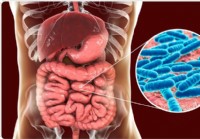 Črevesne bakterije lahko napovedujejo tveganje za pljučno hipertenzijo
Črevesne bakterije lahko napovedujejo tveganje za pljučno hipertenzijo
 Kako se znebiti hemoroidov:vrste, vzroki in zdravljenje
Kako se znebiti hemoroidov:vrste, vzroki in zdravljenje
 C. diff (C. difficile Colitis)
Dejstva, ki bi jih morali vedeti o C. razlika (C. difficile kolitis) Simptomi C. difficile kolitis so zvišana telesna temperatura, driska in bolečine v trebuhu. Clostridium difficile kolitis (C
C. diff (C. difficile Colitis)
Dejstva, ki bi jih morali vedeti o C. razlika (C. difficile kolitis) Simptomi C. difficile kolitis so zvišana telesna temperatura, driska in bolečine v trebuhu. Clostridium difficile kolitis (C
 7 znakov, da imate v tankem črevesu prekomerno rast bakterij SIBO (in kaj storiti glede tega)
Vas muči napihnjenost, zaprtje, plini ali vetrovi? Bi radi vedeli, kaj ga povzroča? Obstaja malo znano stanje, imenovano prekomerna rast bakterij v tankem črevesu (SIBO), za katerega se ocenjuje, da p
7 znakov, da imate v tankem črevesu prekomerno rast bakterij SIBO (in kaj storiti glede tega)
Vas muči napihnjenost, zaprtje, plini ali vetrovi? Bi radi vedeli, kaj ga povzroča? Obstaja malo znano stanje, imenovano prekomerna rast bakterij v tankem črevesu (SIBO), za katerega se ocenjuje, da p
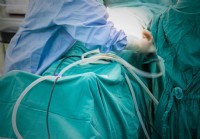 Operacija želodca:kaj pričakovati na dan operacije
Kirurgija želodca, znana tudi kot rektomija želodca, je postopek, pri katerem se odstrani večji del želodca, da se pospeši izguba teže. Postopek se običajno izvaja v bolnišnici v splošni anesteziji, o
Operacija želodca:kaj pričakovati na dan operacije
Kirurgija želodca, znana tudi kot rektomija želodca, je postopek, pri katerem se odstrani večji del želodca, da se pospeši izguba teže. Postopek se običajno izvaja v bolnišnici v splošni anesteziji, o